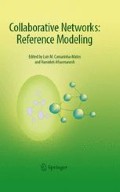A framework is defined for ARCON reference modeling, introducing multiple modeling perspectives of: Environment characteristics, life cycle stages, and modeling intents. This novel modeling framework takes into account contributions from previous related works, mainly on enterprise modeling, and extends them further to the context of collaborative networked organizations, aiming at provision of a comprehensive environment for modeling the variety of cases of collaborative, namely the VO Breeding Environment, Virtual Organization, Professional Virtual Community, and Virtual Team.
Access this chapter
Tax calculation will be finalised at checkout
Purchases are for personal use only
Preview
Unable to display preview. Download preview PDF.
References
Afsarmanesh, H.; Camarinha-Matos, L.M. (2005). A Framework for Management of Victual Organization Breeding Environments. In Proceedings of PRO-VE’05 - Collaborative Networks and their Breeding Environments, Valencia, Spain, 26-28 Sept 2005, (Springer: Boston).
Bifulco, A.; Santoro, R. (2005). A conceptual framework for professional virtual communities. In Collaborative Networks and their Breeding Environments, pp. 417-424, IFIP Vol. 186, 2005, (Springer: Boston).
Camarinha-Matos L.M., Afsarmanesh H. (2007). A comprehensive modeling framework for collaborative networked organizations. In the Journal of Intelligent Manufacturing, Springer publisher. Volume 18, Number 5, pp. 527-615, October 2007.
Camarinha-Matos, L.M.; Afsarmanesh, H. (2005-a). Collaborative networks: A new scientific discipline, J. Intelligent Manufacturing, 16(4-5), pp439-452.
Camarinha-Matos, L.M.; Afsarmanesh, H.; Ollus, M. (Editors) (2005-b). Virtual Organizations - Systems and Practices, (Springer: Boston).
Camarinha-Matos, L.M.; Afsarmanesh, H. (Editors) (2004). Collaborative Networked Organizations - A research agenda for emerging business models, (Springer: Boston).
EGA (2005). Enterprise Grid Alliance Reference Model, 13 Apr 2005. http://www.gridalliance.org/en/workgroups/ReferenceModel.asp
Van Eijnatten, F.M.; Putnik, G.D. (2005). A Different View of Learning and Knowledge Creation in Collaborative Networks. In Proceedings of PRO-VE’05 - Collaborative Networks and their Breeding Environments, Valencia, Spain, 26-28 Sept 2005, (Springer: Boston).
FEA (2005). FEA Consolidated Reference Model, May 2005, http://www.whitehouse.gov/omb/egov/documents/CRM.PDF
Huan, S. H., A review and analysis of supply chain operations reference (SCOR) model. In Supply Chain Management: An International Journal, 9(1), 2004, (Emerald).
IFIP-IFAC TFAEI (2003). GERAM - The generalized enterprise reference architecture and methodology, IFIP-IFAC Task Force on Architectures for Enterprise Integration, in Handbook on Enterprise Architecture (P. Bernus, L. Nemes, G. Schmidt, Ed.s), (Springer, Heidelberg).
Katzy, B.; Zhang, C.; Loeh, H. (2005). Reference models for virtual organizations. In Virtual organizations: Systems and Practices, L. M. Camarinha-Matos, H. Afsarmanesh, M. Ollus (Editors), (Springer: Boston).
Noran, O. (2003). A mapping of individual architecture frameworks (GRAI, PERA, C4ISR, CIMOSA, ZACHMAN, ARIS) onto GERAM. In Handbook on enterprise architecture, P. Bernus, L. Nemes, G. Schmidt (Ed.s), (Springer: Boston).
Stewart, G. (1997). Supply-chain operations reference model (SCOR): the first cross-industry framework for integrated supply-chain management. In Logistics Information Management, 10(2), (Emerald).
Tolle, M.; Bernus, P. (2003). Reference models supporting enterprise networks and virtual enterprises, Int. Journal of Networking and Virtual Organisations, 2(1), pp. 2 - 15.
Tolle, M.; Bernus, P.; Vesterager, J. (2002). Reference models for virtual enterprises. In Collaborative business ecosystems and virtual enterprises (L. M. Camarinha-Matos, Editor), (Kluwer Academic Publishers: Boston).
Vernadat, F.; Kosanke, K. (1992). CIM-OSA: A Reference Architecture for CIM. In Proceedings of the IFIP TC5 / WG5.3 Eight International PROLAMAT Conference on Human Aspects in Computer Integrated Manufacturing, FIP Transactions; Vol. B-3, (North-Holland).
Williams, T.J. (1994). The Purdue Enterprise Reference Architecture. In Computers in Industry, 24, (2-3) pp. 141-58.
Zachman, J. A. (1987). A Framework for Information Systems Architecture. In IBM Systems Journal, 26(3).
Editor information
Editors and Affiliations
Rights and permissions
Copyright information
© 2008 Springer Science+Business Media, LLC
About this chapter
Cite this chapter
(2008). The ARCON modeling framework. In: Camarinha-Matos, L.M., Afsarmanesh, H. (eds) Collaborative Networks: Reference Modeling. Springer, Boston, MA. https://doi.org/10.1007/978-0-387-79426-6_7
Download citation
DOI: https://doi.org/10.1007/978-0-387-79426-6_7
Publisher Name: Springer, Boston, MA
Print ISBN: 978-0-387-79425-9
Online ISBN: 978-0-387-79426-6
eBook Packages: Computer ScienceComputer Science (R0)

